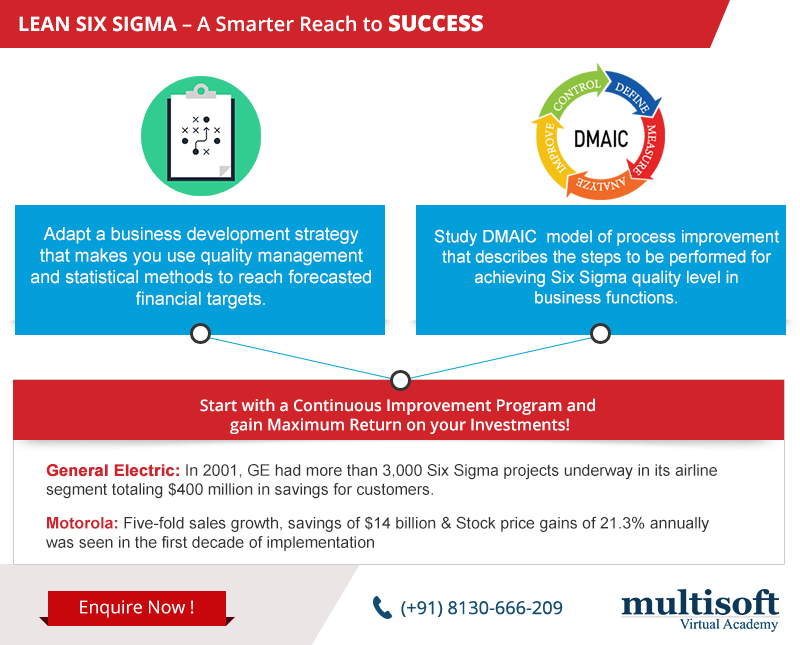
Introduce the concept of Six Sigma as a set of techniques and tools for process improvement that was developed in the mid-1980s. Emphasize its importance in today's competitive business environment for eliminating defects, improving processes, and ensuring quality. Mention that learning Six Sigma methodologies can be a game-changer for professionals looking to enhance their careers and organizations aiming for excellence.
Briefly explain the DMAIC (Define, Measure, Analyze, Improve, Control) methodology, which is at the heart of Six Sigma. Describe how it provides a structured approach to problem-solving and process improvement. Highlight that Six Sigma Green Belt Training is not just a quality control program but a comprehensive management approach that strives for excellence in all aspects of business.
Offer a brief guide on how to begin learning Six Sigma:
Share brief anecdotes or examples of companies and individuals who have achieved significant improvements in their operations, efficiency, and profitability by implementing Six Sigma methodologies. This can serve as inspiration and proof of the effectiveness of Six Sigma.
Conclude by reinforcing the idea that learning Six Sigma is a smart investment in one’s professional development and an organization's success. Encourage readers to take the first step towards mastering Six Sigma to not only enhance their career prospects but also contribute to their organization's journey towards operational excellence.
Learn Six Sigma – A Smarter Reach to Success
In an era where excellence is not just aimed for but expected, Six Sigma emerges as a beacon of quality, efficiency, and success. Originally developed in the mid-1980s, Six Sigma's relevance has not waned; instead, it has become a crucial element in the competitive landscape of business operations.
At its core, Six Sigma is more than a quality control program; it's a disciplined, data-driven approach aimed at eliminating defects in any process. From manufacturing to transactional and from product to service, the methodologies of Six Sigma pave the way for companies to achieve unparalleled quality control and operational efficiency.
Central to Six Sigma is the DMAIC methodology – Define, Measure, Analyze, Improve, and Control. This systematic approach to problem-solving ensures that improvements are based on data and processes are brought closer to perfection with each cycle.
The benefits of learning Six Sigma extend far beyond personal career advancement. It equips professionals with a versatile skill set, including superior problem-solving and analytical capabilities. For organizations, the implementation of Six Sigma methodologies can lead to substantial cost savings, enhanced customer satisfaction, and, ultimately, a stronger bottom line.
Embarking on the Six Sigma journey begins with a commitment to learning. Whether through self-education, formal certification, or practical application, each step brings you closer to mastering this powerful approach to business excellence.
Countless organizations worldwide have transformed their operations, reduced costs, and improved customer satisfaction by integrating Six Sigma principles into their business practices. These success stories serve as a testament to the effectiveness and enduring value of Six Sigma.
Learning Six Sigma is not just an investment in your professional development; it's a commitment to excellence. As businesses continue to evolve in a landscape defined by efficiency and quality, Six Sigma stands as a critical element in achieving success. Embrace the journey towards Six Sigma mastery and watch as doors to new opportunities and achievements open before you.
| Start Date | Time (IST) | Day | |||
|---|---|---|---|---|---|
| 28 Feb 2026 | 06:00 PM - 10:00 AM | Sat, Sun | |||
| 01 Mar 2026 | 06:00 PM - 10:00 AM | Sat, Sun | |||
| 07 Mar 2026 | 06:00 PM - 10:00 AM | Sat, Sun | |||
| 08 Mar 2026 | 06:00 PM - 10:00 AM | Sat, Sun | |||
|
Schedule does not suit you, Schedule Now! | Want to take one-on-one training, Enquiry Now! |
|||||